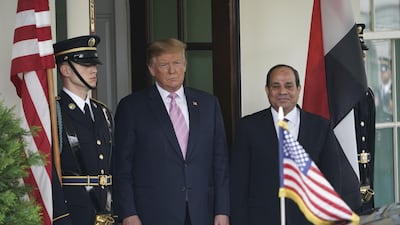Even before Egypt’s withdrawal from the Middle East Strategic Alliance last week, the Trump administration was struggling to launch the bloc as disagreements over its goals, threats and structure marred consultations.
Cairo told Washington and other Mesa participants of its decision to withdraw before a meeting of the group in Riyadh on April 7, Reuters reported.
Two official sources from the proposed alliance confirmed to The National that Egypt had left the talks and was officially out.
US President Donald Trump has been hoping to launch the security and economic alliance, informally called the Arab Nato, since mid-2017.
It would include the US, Saudi Arabia, the UAE, Bahrain, Oman, Kuwait, Qatar, Egypt and Jordan, and would be focused on countering Iran, deepening defence relations, energy co-operation and dealing with other threats.
The concept is not new. In 1953, then US president Dwight Eisenhower tried to build an Arab bloc to counter communism in the Middle East, and several US leaders have tried unsuccessfully since.
The Trump administration now faces a major setback and may have to restructure the proposed alliance, given Cairo’s strategic and military significance.
A US official said that Egypt “plays a very important role in regional security and is a critical strategic partner for the US".
“The United States and all member countries want Egypt to be part of the alliance, which will have many benefits.
"We continue our engagement with the government of Egypt and hope they will seize the opportunity to play a leadership role as the alliance is formed.”
Cairo’s exit relates to larger concerns about the alliance and how its formation would evolve.
Initially there were hopes for a grand vision that would state the alliance’s goals and mission, before going into details about its locations and tasks.
Some of the partners felt that Washington was putting the cart before the horse by discussing defence issues first.
Yasmine Farouk, at the Carnegie Endowment for International Peace, was not surprised by Egypt’s exit.
“Since the beginning, Mesa’s conception was incompatible with Egyptian policy,” Ms Farouk said.
“Egypt is systematically conservative when it comes to the deployment of its military in the region, is not part of the open confrontation with Iran and is sensitive to operating under foreign command and control."
But she said Egypt’s withdrawal was not necessarily a detriment to forming the alliance.
“It might ease an agreement between the administration and Gulf countries," Ms Farouk said.
"The administration is more interested in a defence co-operation among Gulf countries than in a co-operation that involves Egypt anyway."
Other differences have constrained the alliance and forced Washington to delay the launch summit.
Defining the threats is a major point of contention that is likely to continue after Egypt’s exit.
Disagreements about how to view groups such as the Muslim Brotherhood, how to address Iran, collective defence and defence relations with Russia and China have not yet been resolved.
The US official said Washington would continue “over the coming months to solicit input from member countries and work together to shape the alliance”.
But some see little to no room for Mesa to emerge soon.
"It was dead even before Egypt's exit, which put a last nail in the coffin," said Daniel Serwer, a scholar at the Middle East Institute.
Mr Serwer said US Congress tension with Saudi Arabia over Yemen and the Jamal Khashoggi killing were other stumbling blocks.
He said the US strategy was an attempt “to keep Mesa alive but only as a zombie, the walking dead".

